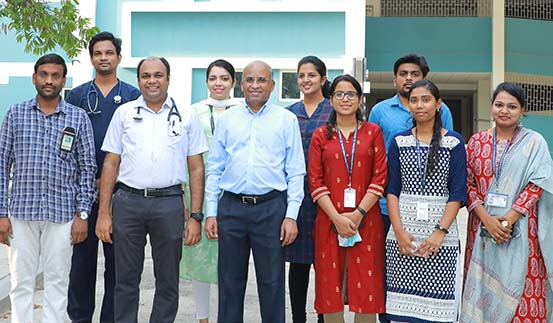
Indian researchers have come up with the appropriate antibiotic treatment for severe scrub typhus, a neglected but widespread re-emerging zoonotic infection, for which treatment was unclear until now.
Scrub typhus is a life-threatening infection caused by the bacteria, Orientia tsutsugamushi. This infection, which primarily affects rodents, is transmitted to humans (zoonoses) by the larvae of trombiculid mites.
The researchers found out that treatment using a combination of two antibiotics – doxycycline and azithromycin – both in intravenous formulations is more effective in treating severe scrub typhus than single-drug therapies. On Thursday, March 2, the study was published in The New England Journal of Medicine.
The most effective treatment for scrub typhus
Scrub typhus infection is a major public health concern in India and other South Asian countries. According to the study, it is estimated that in endemic regions, about a billion people are at risk of contracting the infection, and 1.5 lakh people die from it every year. The study aimed to identify the best treatment option for people with severe scrub typhus.
The typical symptoms of scrub typhus are fever, headache, cough, shortness of breath, confusion and disorientation. “About six per cent infected with scrub typhus could die in spite of diagnosis and treatment. One-third would develop a severe disease that affects multiple organs in the body which could lead to lethally low blood pressure. The fatality rate in severe disease can reach up to 70 per cent without treatment and 24 per cent with treatment,” said Professor George M Varghese, an infectious diseases physician and researcher from Christian Medical College in Vellore, Tamil Nadu.
Speaking to Happiest Health, Dr Varghese, who spearheaded the study said that for a long time, doxycycline, an antibiotic was considered a good treatment for scrub typhus. However, in recent years, the use of doxycycline had reduced because of its toxicity. Meanwhile, the use of oral azithromycin for mild scrub typhus has increased, said the researcher, adding that there was no strong evidence to use it.
“There was an additional challenge. Although doxycycline was considered for scrub typhus treatment, it was unavailable in the intravenous formulation and was given only in the form of tablets [oral formulation],” said Dr Varghese. He added that giving tablets was questionable especially if the person is on the ventilator. Thus, the need for an IV formulation was necessary.
Hence for treating severe scrub typhus cases, some used IV azithromycin and oral doxycycline tablets and some used one of these.
In the absence of clear evidence, the researchers took up the study to find out what was more effective. “We had three arms of the study,” said Dr Varghese. One group (265 infected people) was given doxycycline. Another group (263) was given azithromycin and the final group (266) was given both azithromycin and doxycycline in an IV formulation.
He added that based on the request from the team, a generic pharmaceutical producer from India provided a doxycycline IV formulation for the study in 2017. The same is available in the market now.
The study assessed the efficacy of treatment using death from any cause on day 28, persisting complications on day 7 and persisting fever on day 5 as indicators. The side effects of treatment were also assessed.
“The implication of this study is that when using a combination of azithromycin and doxycycline (IV formulations) to treat severe scrub typhus, the infected persons can be discharged from the hospital by day 7 as they would have fewer persisting complications, such as respiratory distress syndrome (ARDS), hepatitis, hypotension/shock, meningoencephalitis and kidney failure,” Dr Varghese said.
According to the researchers, this trial has provided evidence that combination therapy with intravenous doxycycline and azithromycin is a better therapeutic option for the treatment of severe scrub typhus than monotherapies of either drug. “This new evidence will change treatment guidelines and save the lives of thousands of people with scrub typhus in the future,” said Dr Varghese. Speaking about the need for the treatment, he said that in CMC Vellore alone, no less than 800 severe scrub typhus cases are seen every year.
The study was conducted for five years between 2017 to 2022 covering a total of 794 affected persons with severe scrub typhus treated in seven hospitals. The study was conducted at the Postgraduate Institute of Medical Education and Research (PGIMER), Chandigarh; Indira Gandhi Medical College & Hospital (IGMC) Shimla; Pandit Bhagwat Dayal Sharma Post Graduate Institute of Medical Sciences, Rohtak; Jawaharlal Institute of Postgraduate Medical Education & Research (JIPMER), Puducherry; Christian Medical College, Vellore; Sri Venkateswara Institute of Medical Sciences (SVIS) Tirupati and Kasturba Medical College (KMC) Manipal. The study was funded by the DBT/Wellcome India Alliance.
Takeaways
- A multicentre study conducted by Indian researchers in seven hospitals across the country has come up with appropriate antibiotic treatment for severe scrub typhus.
- The study highlighted that a combination of two antibiotics – doxycycline and azithromycin – both in intravenous formulations is more effective in treating severe scrub typhus than single-drug therapies.
- Scrub typhus is a bacterial infection, a major public health concern in India and other South Asian countries.















